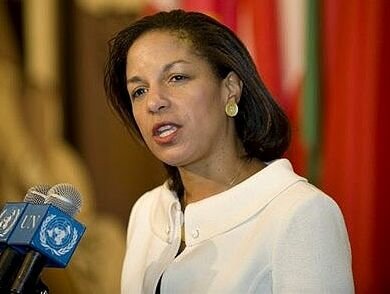United States re-examines opposition to UN Declaration
American Indians, Featured — By Valerie Taliman on April 24, 2010 at 21:41NEW YORK – Political tides are turning as international support for the United Nations Declaration on the Rights of Indigenous Peoples continues to grow, putting greater pressure on Canada and the United States to fully endorse it.
One day after New Zealand reversed its position and supported the Declaration, U.N. Ambassador Susan Rice announced that the United States is undertaking a review of its opposition.
“I am pleased to announce that the United States has decided to review our position regarding the U.N. Declaration on the Rights of Indigenous Peoples,” she said, addressing the Ninth Session of the United Nations Permanent Forum on Indigenous Issues.
“During President Obama’s first year in office, tribal leaders encouraged the United States to re-examine its position on the Declaration – an important recommendation that directly complements our commitment to work together with the international community on the many challenges that indigenous peoples face. We will be conducting a formal review of the Declaration and the U.S. position on it.
“There is no American history without Native American history. There can be no just and decent future for our nation that does not directly tackle the legacy of bitter discrimination and sorrow that the first Americans still live with. And America cannot be fully whole until its first inhabitants enjoy all the blessings of liberty, prosperity, and dignity. Let there be no doubt of our commitment. We stand ready to be judged by the results.”
Many Native leaders view this as a positive sign that the United States is moving toward endorsing the Declaration. Critics say there is no need to delay it with additional reviews since the United States was part of negotiations for more than 25 years.
Tonya Gonnella Frichner, an Onondaga attorney and member of the Permanent Forum representing North America, said during his campaign President Barack Obama clearly stated to tribal leaders that he was committed to the adoption of the Declaration.
“We still feel very positive about it and hope that he will commit to that promise,” she told the forum, attended by nearly 2,000 registered delegates.
Others were disappointed that the United States – a country that postures itself as a champion of democracy and human rights worldwide – did not support it outright.
“We’ve already been there. It seems extraordinary to review it again since it has already been debated and adopted by the international community,” said Debra Harry, Indigenous People’s Council on Biocolonialism executive director. “We’d like to see the United States adopt it now, and then let’s talk about how to implement it domestically.”
A less formal meeting was scheduled on the third day of the forum to discuss elements of the review, and to allow time for Native delegates to dialog with members of the U.S. delegation led by Kimberly Teehee, the White House senior policy adviser for Native American Affairs; and Ambassador Rick Barton, U.S. representative to the Economic and Social Council.
Teehee said anytime new laws or policies are introduced, it triggers a process for review across federal agencies to evaluate how it will impact United States laws, policies and regulations. This must be done to properly plan for implementation, she said.
“We are a new administration and we care about what you think. Our approach has been to continue the president’s engagement and commitment to Indian country.
“In the spirit of consultation and partnership, we will engage tribal leaders, stakeholders and NGOs (non-governmental organizations.) We need to be thoughtful about that process. I assure you that your voices will be heard.”
When asked about the timeframe for the review, Teehee said the process was just beginning and she could not yet define how long it would take.
Cayuga Chief Karl Hill of the Haudenosaunee reminded the U.S. delegation that the Iroquois Confederacy negotiated the first treaties with the United States dating back to 1704.
“We have worked on this since its beginning more than 30 years ago, and we urge you to be expeditious in your review,” said Hill, who delivered a statement from the Global Indigenous Peoples Caucus containing eight major recommendations for implementing the Declaration.
The Declaration has strong provisions for supporting treaty rights and affirms indigenous peoples’ collective rights to self-determination and control over their lands and natural resources. These rights will likely conflict with development plans by extractive industries and multinational corporations, but will provide greater protections for indigenous peoples.
U.N. Secretary-General Ban Ki-moon encouraged nation states to move forward with adopting the Declaration, and cited alarming statistics from the first-ever United Nations report on the State of the World’s Indigenous Peoples released in January.
“Indigenous peoples suffer high levels of poverty, health problems, crime and human rights abuses all over the world. You make up five percent of the world’s population – but one third of the world’s poorest,” he said. “Every day, indigenous communities face issues of violence, brutality and dispossession. In some countries, an indigenous child can expect to die 20 years earlier than his non-Native
compatriots.
“Indigenous cultures, languages and ways of life are under constant threat from climate change, armed conflict, lack of educational opportunities and discrimination.
“Elsewhere, your cultures are being distorted, commodified and used to generate profits which do not benefit indigenous people, and can even lead to harm. This is not only a tragedy for indigenous people. It is a tragedy for the whole world.”
Ban said that according to current forecasts, 90 percent of all languages could disappear within 100 years. The loss of these languages erodes an essential component of a group’s identity.
“Diversity is strength – in cultures and in languages, just as it is in ecosystems.
“The loss of irreplaceable cultural practices makes us all poorer, wherever our roots may lie. That’s why the theme this year is ‘Development with Culture and Identity.’ It highlights the need to craft policy measures that promote development while respecting indigenous peoples’ values and traditions.
“We need development that is underpinned by the values of reciprocity, solidarity and collectivity. And we need development that allows indigenous peoples to exercise their right to self-determination through participation in decision-making on an
equal basis.
“The United Nations will continue to support you.”
Tags: aboriginals, Ban Ki-moon, Barack Obama, Debra Harry, Declaration on the Rights of Indigenous Peoples, Indigenous People’s Council on Biocolonialism, indiginous, Iroquois Confederacy, Kimberly Teehee, native americans, new zealand, susan rice, Tonya Gonnella Frichner, United NationsAuthor: Valerie Taliman (6 Articles)

Valerie Taliman, Navajo, is president of Three Sisters Media, which offers publishing, social media and public relations services. She is also an award-winning journalist specializing in environmental, social justice and human rights issues. She is based in Albuquerque, N.M. Contact her at [email protected].



 Share This
Share This Tweet This
Tweet This Digg This
Digg This Save to delicious
Save to delicious Stumble it
Stumble it





 Backslide in America's "National conversation on race"
Backslide in America's "National conversation on race" The continuing struggle for justice in Bhopal
The continuing struggle for justice in Bhopal The next justice
The next justice







